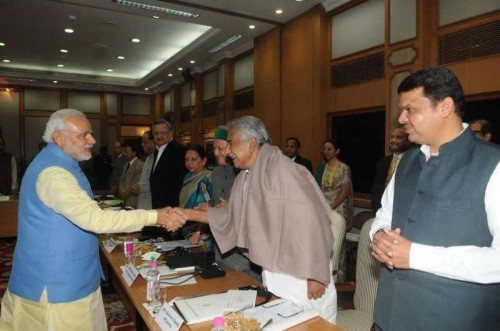
Prime Minister Narendra Modi met chief ministers to hear their views on the restructuring of the Planning Commission.
Chief Ministers Mamata Banerjee of West Bengal and Omar Abdullah of Jammu and Kashmir are reportedly not attending the meeting taking place at the prime minister’s residence.
Modi told parliament Friday that the government had consulted experts and economists in detail and also held discussions within the Planning Commission on its restructuring.
The Planning Commission was conceived by India’s first prime minister Jawaharlal Nehru. It was formed March 15, 1950 — and with it was born the Five-Year Plans.
Tamil Nadu Chief Minister O. Panneerselvam Sunday said chief ministers should be given representation in the new body that will replace the Planning Commission.
He said the proposed body should prepare sector-wise strategic vision documents specifying the medium- and long-term perspective while calling for abandoning of annual plan discussions.
Panneerselvam was speaking at a meeting in New Delhi convened by Prime Minister Narendra Modi for the chief ministers to hear their views on the restructuring of the Planning Commission.
Panneerselvam said: “I would urge that the new institution should create sector-wise strategic vision documents which would provide a longer-term perspective of where the nation aspires to be in that particular sector.”
“At the same time, the medium-term plan for a period of five years also continues to be relevant.
“Here the emphasis needs to be on how policy co-ordination is to be achieved, resources are to be garnered and implementation mechanisms created to work towards the longer-term goals,” he added.
Besides, Panneerselvam urged the abandoning of the irrelevant annual exercise of annual plan discussions with each state as it does not add any value.
On the sharing of revenue, he said it is feasible for the central government to share at least 50 percent of its aggregate resources with the states under Article 270 of the constitution based on the recommendations of the finance commission.
Only such a far-reaching change in the sharing of financial resources will make states equal partners in the process of development, he added.
“Until such time that the far reaching changes of abolition of the Plan-Non-Plan distinction and routing all central devolution through the finance commission route are effected, we may have to work with tweaks to the existing system,” Panneerselvam said.
Referring to the innovation and knowledge hubs mentioned in the back-ground note on the proposed institution, he said: “The effectiveness with which the New Institution can play this role depends on the quality of knowledge and information that would be made available.
“It should be the high quality and value of the technical advice and support that attracts States and other stakeholders to access the Hub.”
Panneerselvam said the Unique Identity Authority of India and Direct Benefit Transfer are basically executive functions and should be handled by the parent ministries of the central government.
He also urged the central government to ensure “greater fairness” while assisting states vis-a-vis centrally-sponsored schemes.
“There has to be greater fairness in the criteria adopted for the allocation of central assistance in such schemes,” Panneerselvam said.
The chief minister recommended that there was a need for more clarity and certainty in the fund allocation for better planning and implementation of the schemes.
“The fund allocation formulae need to provide clarity and more certainty on the level of allocation for the year to enable for better planning and implementation.”